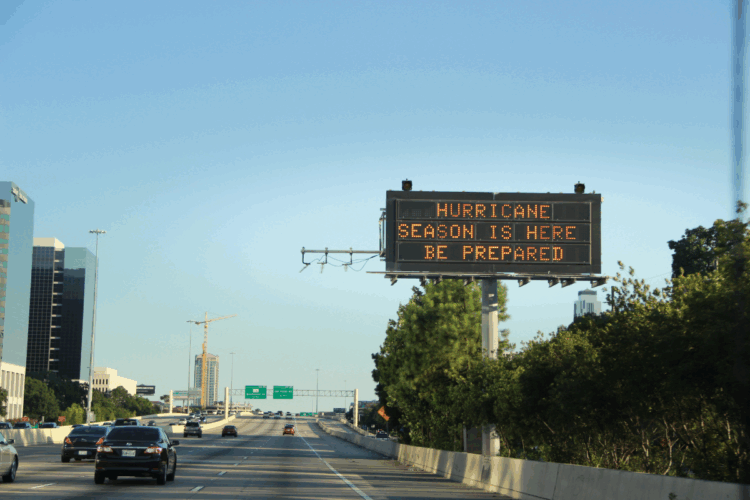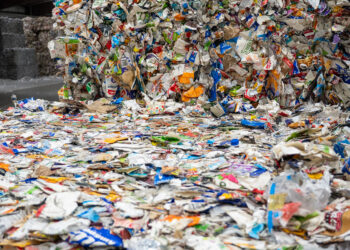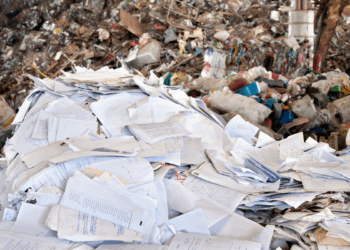As the first major hurricane of the season hit Texas last week, MRFs and processors braced for disrupted services, flooding and power outages, which are familiar obstacles for Gulf Coast operators each June through November.
Beryl, a Category 1 storm, made landfall along the Texas coast on July 8, centered heavily on Houston, the fourth-largest city in the U.S. The City of Houston has 2.3 million residents, and an additional 5 million people live in surrounding areas, according to the U.S. Census Bureau.
Hurricanes typically impact the materials recovery sector in a variety of direct and indirect ways. While suspended collection might be an immediate disruption, rising freight costs and storm debris management can be longer-term headaches that filter to the waste and recycling industry.
Municipal collection and processing briefly disrupted
The City of Houston suspended waste and recycling collection July 8-13, according to a Solid Waste Authority press release.
Houston-based WM told Resource Recycling in an email that its recycling facilities had resumed operations on July 9, but the company didn’t address the status of Natura PCR, in which WM holds a controlling interest. Natura PCR has a film recycling plant in Waller, northwest of Houston.
Phoenix-based Republic Services told Resource Recycling July 15 in an email that it had generally resumed collection operations citywide, “and we are working diligently to service all our customers as quickly as possible.”
“Though recycling service has resumed for most customers, some in East Houston are still impacted by the storm’s aftermath and will continue to experience delays,” Republic added. “We will resume service in these areas as soon as conditions allow.”
Although Republic does not have a MRF in Houston, it provides recycling services to “thousands of residential, commercial and municipal customers across the Houston area,” the company said.
Central areas of Houston lost power for three to seven days, and the FCC Environmental MRF is located in that area.
Although the Houston-area MRFs were reported to be running as of July 15, collected material was likely to be wet, making sorting more complicated.
“Anytime mixed recycling material gets wet, it often has to be dried before processing to avoid the disruption of wet paper/fiber, which will render some sortation processes ineffective,” said Emily Friedman, senior editor of plastics recycling at ICIS, adding that Beryl occurred very early in hurricane season, which lasts early June through early November.
“Storms don’t traditionally start ramping up till August and September, so we’re definitely not out of the woods,” she said.
Resin market impact?
Because recycled plastic prices are so tied to virgin resin markets, there could be a ripple impact for post-consumer resin pricing.
The Gulf Coast is home to most U.S. virgin PE production capacity. And although PET production is located mainly in the Carolinas, the feedstocks for PET are largely produced along the Gulf Coast. As a result, virgin resin production could be affected by a storm hitting anywhere between Corpus Christ, Texas and southwestern Louisiana – a distance of roughly 350 miles.
In Mexico, Alpek also has production for both PET and its feedstock in two locations along the eastern coast of the Gulf of Mexico.
Virgin resin prices reflect both supply and demand as well as production costs, and they fluctuate more often than those for recycled resin – with the latter changing monthly rather than daily or weekly. Recycling prices are shaped more by supply and demand, and with converters keeping extremely low inventories of resin, even a minor disruption could cause major issues.
“People are running so lean, to conserve cash, and because they got burned in the past (by rapid rises or falls in pricing), any sort of draw on the system would deplete these narrow reserves, and we could see that filter through,” Friedman said.
Although restoring power after the storm was a major concern, water quality was also problematic, with 135 wastewater treatment plants still offline three days after the storm, according to the Texas Department of Emergency Management.
As of July 15, the state had distributed more than 5.3 million bottles of water, according to a press release.
“From a beverage perspective, the PET category would draw down (inventory) for water bottles and beverages,” said Friedman, adding that demand could also increase temporarily for bagged ice to keep food cool during power outages and trash bags to clean up debris.
However, Houston doesn’t have a robust recycling system or a deposit program, she said.
“I have a feeling most of those PET bottles won’t make their way into the system,” Friedman said.





























